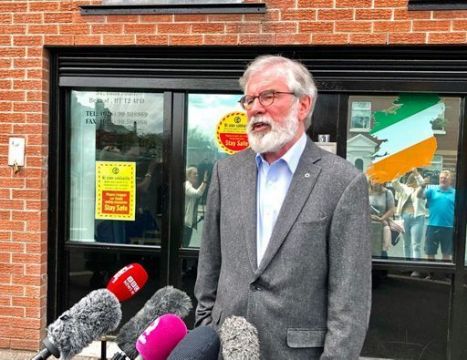The Provisional IRA could impose its view on Sinn Féin, but the reverse was not the case, according to a view recorded in the Irish state archives.
Dermot Gallagher, a senior official in the Department of Foreign Affairs, noted a conversation with then designate Catholic Primate Cahal Daly in Belfast on November 24th, 1990.
In archived papers now released for public viewing, Mr Gallagher wrote that the cleric was convinced that the IRA and Sinn Féin were separate groups.
“He also expressed the view that, while the IRA was in a position to impose its view on Sinn Féin, the reverse was not the case,” he wrote.
Meanwhile, in a note recorded by official Brendan McMahon, lawyer Paddy McGrory is said to have given the view in December 1990 that while Sinn Féin president Adams was “one of few” in the republican movement with long term vision, he was “very much constrained by the ‘army'”, and “unable to make any significant move without the approval of the IRA”.
In the same period SDLP leader John Hume was meeting regularly with Mr Adams.
Mr Gallagher wrote that Bishop Daly believed direct messages from the Provisional IRA “would carry more weight”.
“If this is true, and we suspect that the Bishop’s reading of the situation in this regard is accurate, it follows that messages emanating from the IRA proper (as at present via the chaplains) probably carry more weight than anything emerging from the on-going dialogue between Adams and John Hume,” he wrote.
Mr Gallagher wrote that the cleric believed the Provisional IRA was serious about turning away from violence.
Bishop Daly is said to have assessed the Provisional IRA had the capacity to go on almost indefinitely at the present or increased level of activity, but “seemed to realise that their objective was now not achievable through military means”.
The cleric was also said to have described a speech by former secretary of state Peter Brooke on November 9th, 1990, declaring that Britain had “no selfish strategic or economic interest” in Northern Ireland as “historic”.
Mr Gallagher recorded numerous conversations with Mr Hume across 1990 too.
He noted that Mr Hume had briefed Mr Brooke about a meeting with Mr Adams, and suggested setting up a meeting between one of his officials and senior Sinn Féin figures.
“According to Hume, the Secretary of State appeared interested in Adams’ thinking and in Hume’s firm belief that he was serious in seeking an alternative way forward to violence,” he wrote in a note dated December 6th, 1990.
“At the conclusion of their discussion, Hume suggested that a senior British official (he mentioned John Chilcot) might visit him at his Donegal home at an early date.
“Hume would then organise for Adams and Martin McGuinness to call to the house while Chilcot was there.
“Brooke promised to consider the suggestion and come back to Hume.”
The note also recorded that Mr Hume was “under pressure” from Mr Adams to indicate whether Dublin is “interested in responding to the signals he has been conveying through Hume, specifically through meeting Adams in strict privacy”.
“In this regard, Adams emphasised to Hume that, if it could be established that Dublin would respond seriously, he would be prepared to go to the IRA Army Council and urge them to consider agreeing to a cessation of violence,” he noted.
The newly published papers are contained in National Archives file reference number 2020/17/34.







